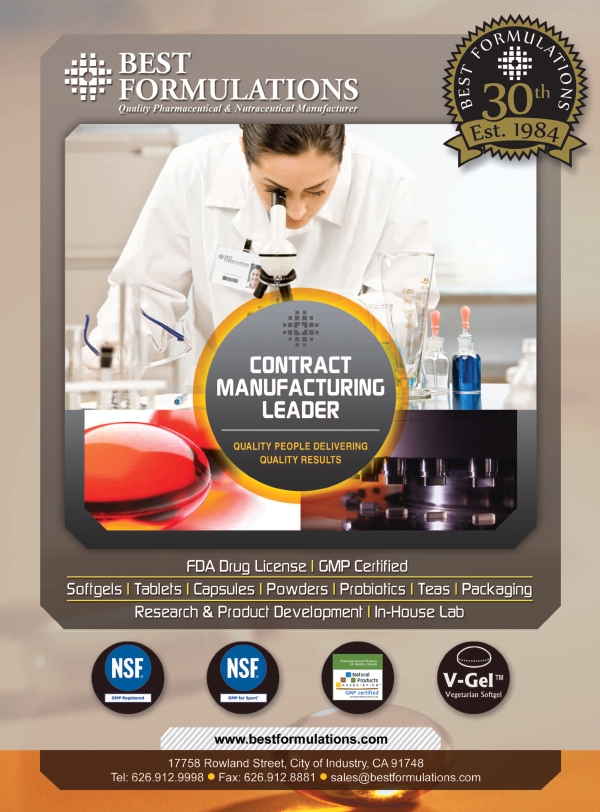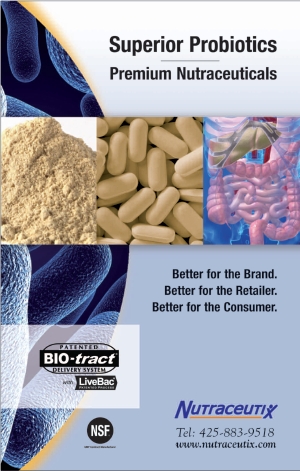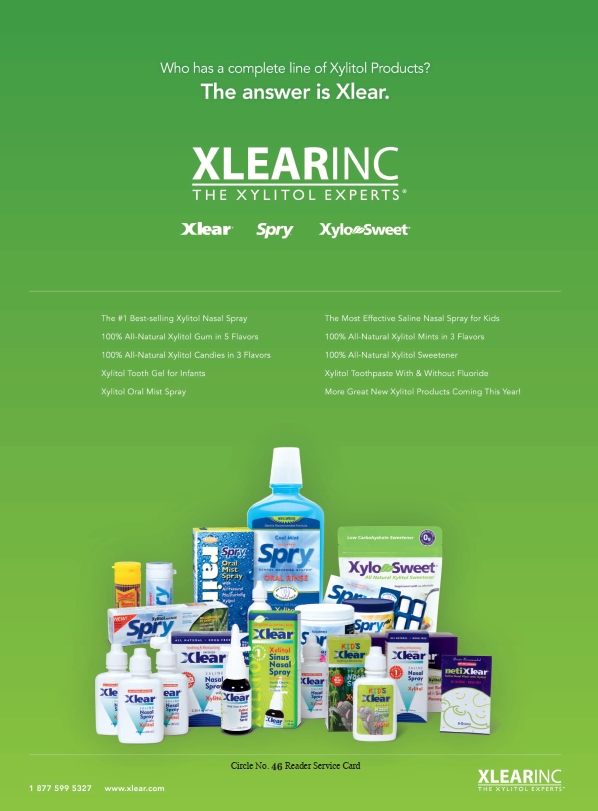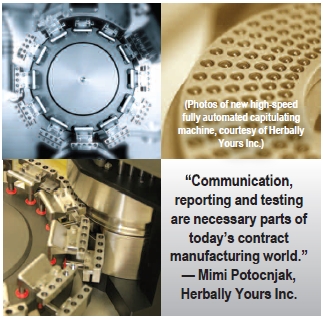Cue 1970s game show music!
“Manufacturer #1 loves to make probiotics and has over 50 years of research experience in the field. Manufacturer #2 hails from the West Coast and recently invested in a handsome new 120,000-ft2 facility. Finally, Manufacturer #3 not only can tell you all about its branded raw materials, but also about its attractive bi-layer tableting technology.
“Now, let’s welcome our lovely Supplement Marketer, who has one tough decision on her hands tonight!”
Yep, a finished product maker is faced with many challenging choices, not the least of which is finding a good contract manufacturer. This company is a partner—not hired help. The right contract manufacturer not only meets your products’ specifications, but can exceed your expectations for quality, innovation and knowledge.
Warning!
Perhaps the most recent concrete illustrations that a contract manufacturing firm is truly a partner are the warning letters that the U.S. Food and Drug Administration (FDA) sent earlier this year to several supplement makers.
The chief complaint from the agency? They didn’t  keep good written records about the products they received from their contract manufacturers, per good manufacturing practices (GMPs) requirements. As FDA put it, “Although your firm may contract out certain dietary supplement manufacturing operations, it cannot, by the same token, contract out its ultimate responsibility to ensure that the dietary supplement it places into commerce…is not adulterated” (1).
keep good written records about the products they received from their contract manufacturers, per good manufacturing practices (GMPs) requirements. As FDA put it, “Although your firm may contract out certain dietary supplement manufacturing operations, it cannot, by the same token, contract out its ultimate responsibility to ensure that the dietary supplement it places into commerce…is not adulterated” (1).
So, while the manufacturing takes place off premises, it’s up to the supplement marketer to keep proper records of all relevant procedures and verify that its contract manufacturer has quality control processes in place.
A good contract manufacturer is ready, willing and able to help with GMP compliance. “It’s in every manufacturer’s best interest to help our customers be GMP compliant,” says Eugene Ung, CEO of Best Formulations, City of Industry, CA.
For instance, visits to your manufacturer should be encouraged. States Gregory Leyer, Ph.D., chief scientific officer at UAS Laboratories LLC, The Probiotic Company, Wausau, WI, “We welcome our customers to audit our facility, of course, and see how our quality program governs what we do and how we do it, resulting in products that are not adulterated and produced with appropriate GMP-compliant record keeping.”
Shaheen Majeed, marketing director at Sabinsa Corp., East Windsor, NJ, whose firm also invites customers to its plant for audits, believes such visits are “the true authentication of their product” and “increase [clients’] understanding of how we’re conducting our production and following current GMPs.”
During such a visit, Shabbir Akand, vice president of sales and marketing at NHK Laboratories, Santa Fe Springs, CA, says customers can review raw material certificates of analysis, batch records and testing certificates, tour the facility and “visualize how their products are manufactured and shipped to them.”
If customers cannot physically be on site, Majeed’s company does a thorough explaination of the basic documentation and all the tests involved.
And, many contract manufacturers also enlist outside help: “We are audited twice a year by a third-party group and continually seek ways to improve,” says Leyer.
 Richard Kaufman, chief operating officer at Paragon Laboratories, Torrance, CA, says his firm is certified by the Natural Products Association (NPA) and NSF for GMP compliance.
Richard Kaufman, chief operating officer at Paragon Laboratories, Torrance, CA, says his firm is certified by the Natural Products Association (NPA) and NSF for GMP compliance.
Third-party compliance is more than just having a feather in one’s cap. Groups like the NPA and NSF can help improve upon compliance and point out areas that have been overlooked, states Majeed.
Paragon also takes further steps to help customers ensure they are in GMP compliance. “We work closely with our clients to ensure that all appropriate specifications are identified before we commit to the creation of a final draft of the Master Manufacturing Records,” states Kaufman.
Also working closely with customers to understand GMPs and their effect on the finished product is Ung’s company. He believes communication and education about his firm’s commitment to quality (through raw materials analysis and finished products testing) help customers understand that too fast a turnaround may not always be a good thing. “Steps in quality cannot be sacrificed in the name of lead time,” he states.
Ung adds, “After signing the appropriate confidentiality agreements, we share the customer’s batch records, ingredient certificate of analysis, and other documents specifically related to their products. In some cases, we may provide some regulatory guidance or point them in the right direction in regards to working with an experienced regulatory consultant or finding the right resource.”
Meanwhile, Akand says his firm helps clients with recordkeeping by helping them obtain documents like a finished product certificate of analysis, a finished product specification sheet, a finished product master formula, a finished product stability test and more.
Another layer of quality manufacturing is the mindset that GMP compliance is more than just following a checklist of rules. Rather, a good contract manufacturing partner has the GMPs so engrained in it that following them is second nature and something all its employees embrace.
“We have a GMP state of mind,” states Majeed. “This starts from entry to departure, the way our  employees arrive in the morning until they leave in the evening. No matter which shift they are working, every employee undergoes thorough GMP training, which is documented and reviewed regularly.”
employees arrive in the morning until they leave in the evening. No matter which shift they are working, every employee undergoes thorough GMP training, which is documented and reviewed regularly.”
His company is so serious about compliance that it will not retain an employee that doesn’t understand the necessity of the paperwork involved in GMP compliance. “We simply can’t skip any type of initial testing/screening of ingredients that come through our warehouse doors,” Majeed adds.
Perhaps the lengths that a good contract manufacturer will take to ensure its clients’ compliance are best summed up by Mimi Potocnjak, president of Herbally Yours Inc., Gilbert, AZ, who states, “We consider it a mutual privilege to be a chosen manufacturer for our customers, and work very closely and under confidentiality to make sure we all comply with regulations.”
She explains how her firm’s efforts toward compliance are embedded into every step, from formulation (by developing testing methods for individual ingredients, “which will guarantee label claims, before the product is ever made,” states Potocnjak), to analytical testing of raw materials (“we develop test methods in partnership with our vendors, and then develop testing methods for the products we manufacture, and share with third-party labs,” she states) to creating a dossier for every product and lot (“so auditors have easy access to any information necessary,” says Potocnjak).
New Shiny Silver Toys
Beyond GMP compliance, many contract manufacturers are busy investing in new capabilities and equipment. In fact, these areas of growth are windows into trending areas.
Case in point: probiotics. Market reports consistently indicate that probiotics sales are growing every year. So, finished products makers are investigating new, innovative ways to bring these products to market.
Leyer says his company also observed this trend, and is meeting it head on. He states, “We are investing in the infrastructure necessary to meet the demands of growing probiotic volumes by adding additional blending, encapsulation, tableting, stick machine and packaging capabilities.”
 His mention of a stick machine could indicate that companies are looking into offering “probiotics on the go” in a stable, powdered, single-serve format.
His mention of a stick machine could indicate that companies are looking into offering “probiotics on the go” in a stable, powdered, single-serve format.
Also speaking of delivery trends for probiotics, Majeed notes that an area gaining ground is the use of shelf-stable probiotics (like his company’s LactoSpore) in unique formats like chewable tablets.
But, probiotics manufacturing is not your run-of-the-mill powder to process. Rather, it requires some finesse, to say the least, and UAS is investing in this, too. Says Leyer, “As probiotics require very specific manufacturing conditions to ensure a quality product, we have also upgraded our temperature and humidity controls in the production suites as well as the expanded warehouse, and recently added additional cooler space to optimize product quality.”
Given these unique manufacturing needs, Leyer suggests that supplement makers consider a probiotic-focused contract manufacturer to “be a partner in that production, which is the foundation behind having a quality product with probiotic experts leading you along the way.”
Speaking of enhanced probiotic technology, Sabinsa also invested in something pretty unique. The firm purchased a commercial-scale tableting machine that can make bi-layer tablets in its Payson, UT, facility and created a stable prebiotic (as Fenumannans)–probiotic (as LactoSpore) bi-layer tablet with this technology.
“The pharmaceutical sector had this type of equipment for years, but we saw a unique way of delivering our type of herbal actives,” says Majeed.
The company’s first botanical bi-layer tablet (NiLitis) was something the industry hadn’t seen before: as Majeed describes it, “an allergy-free, non-glucosamine joint health tablet that delivered unique actives in both slow- and immediate-release stages.” Indeed, the design worked with various deliverables and several bi-layer tablets are now available under Sabinsa’s Integrated Nutritional Composites (INC) line. The technology can even be used to combine otherwise incompatible or difficult to co-formulate ingredients, such as the pre/probiotic blend previously mentioned.
Meanwhile at Ung’s company, there have been improvements in capacity, efficiency and manufacturing capabilities of vegetarian softgel capsules. “This is still a unique and novel delivery method, but has grown by leaps and bounds in the past few years,” he states. He points out that cost is one of the drivers, since the price tag of bovine and porcine gelatins have shot up recently, so “the price gap between non-animal and regular animal-based softgels has closed.” To illustrate his point, Ung says his company currently runs five softgel machines with vegetarian softgels, and can up that amount if customer demand warrants it.
Encapsulation is also a trend noted at Kaufman’s  company. “We have invested and continue to invest in additional capacity in both our manufacturing and packaging departments with new encapsulation machines and tablet and capsule counters being brought on recently,” he states.
company. “We have invested and continue to invest in additional capacity in both our manufacturing and packaging departments with new encapsulation machines and tablet and capsule counters being brought on recently,” he states.
Also trending are powdered supplements, and Ung’s company is seeing this need. The firm invested in an extra high-speed powder filling line, and now has three in total.
Liquids, too, are making a splash. For this reason, GMP Laboratories of America, Anaheim, CA, expanded its liquids manufacturing capabilities recently. Its high-speed production-scale facility is equipped to handle cold fill liquid products such as liquid supplements, syrups, liquid suspensions, vitamin water, oxygenated water, beverages, liquid shots, oils and more.
Potocnjak adds that her company recently bought three new automated filling machines “to keep up with growing orders.”
Meanwhile, increased analytical capability has been implemented at Akand’s firm, with a robust Hazard Analysis and Critical Control Points (HACCP) system. Akand says it’s “an additional measure for preventing hazards that is done in addition to finished product inspection.”
The company also recently added several analytical tools that conduct high-performance liquid chromatography (HPLC), near-infrared spectroscopy and high-performance thin-layer chromatography (HPTLC). “These various instruments help us perform qualitative testing such as identification and organoleptic testing, and quantitative testing such as assay, potency and composition,” says Akand.
The investment in this pricey equipment (and the qualified lab personnel to run them), he says, is not only needed for maintaining GMP compliance, but also “to fulfill our moral obligation of providing our customers with a quality finished product for which we have ensured identity, purity, potency and composition.”
Kaufman says his company also recently purchased additional HPLC and HPTLC instrumentation to support its development efforts.
And at Potocnjak’s company, the newest analytical instrument is a Biolumix for microbial analysis. She explains that this machine has helped her business slash lead times: “We have reduced microbiology results from five to seven days, to 48 hours. Since we test both the raw materials and the finished product in house, we will save a significant amount of time waiting for tests to complete.”
Mission Control
These last investments in analytical equipment speak to the importance of quality assurance and control at responsible contract manufacturers. “UAS Laboratories LLC takes QA/QC very seriously and, in fact, considers it a strategic advantage,” states Leyer. “Significant investment in both personnel and testing capabilities, along with the implementation of a superior QMS program is the driving force behind our continual quality improvement program.”
|
Industry Trends
Those interviewed for this piece were asked to pinpoint the hottest natural products trends they are seeing in their businesses. Here is what they had to say: • Probiotics and prebiotics |
|
Like GMP compliance, it seems that several contract manufacturers feel their analytical procedures are never really complete. Rather, it’s an area to regularly self-evaluate for places to grow. States Kaufman, “Our standard operating procedures and laboratory analytical procedures have been developed over many years and both continue to evolve as we seek continuous improvement.” His firm enlists the help of GMP certifiers (like NSF and NPA) “so that we can stay abreast of new developments in GMP and GLP compliance as well as benefit from a third party’s perspective.”
Akand’s firm takes a similar approach, placing a high value on reputable third-party audits. “We have a full season with multiple on-site audits. Having such a diverse set of auditors evaluate our practices helps shape our company culture towards continuous improvement,” he states. “These visits give us the transparency needed to take proactive measures to mitigate potential weaknesses in our system which will help safeguard the consumers in obtaining a quality product.”
Something to consider about a contract manufacturer is whether or not it outsources its analytical work. Some contract manufacturers partner with a third-party lab because they believe an outside firm can help with more specialized testing and there won’t be a need to invest in analytical equipment.
But, this mentality doesn’t fly with several companies interviewed for this piece. “Our Quality team represents more than 10% of our staff, and they are involved in every part of our process from start to finish,” states Ung, who adds that most of his company’s QA/QC managers have pharmaceutical backgrounds.
Having in-house capabilities in analytical data analysis and interpretation is so important at Potocnjak’s company that she says every step of its process—from formulation to finished product—involves QC/QA, “which is not just a sign off, but rather, a reporting and analysis required to move to the next step.”
Likewise, Majeed believes having an in-house QA/QC staff is a big advantage in areas like quality and even cost savings. “We have the ability to save companies hundreds, if not thousands of dollars in outside testing, as well as quite a bit of time,” he states.
The on-site QA/QC team can also handle numerous analytical tasks that ensure a superior product, like generating access to real-time and accelerated stability data or conducting full-scale microbiological testing. “Most contract manufacturers would have to send out their finished products for micro testing to laboratories; however, at Sabinsa, it’s right upstairs and we can have indications of anything that may be wrong in just three days,” states Majeed.
Another advantage of the micro lab, he says, is that it is used to test production rooms for sanitary conditions as well as test the water and cleaning agents it uses.
In the end, a manufacturer’s pride in quality will be evident in its decisions about analytical testing and GMP compliance. “Less than half of all Americans regularly take some type of prescribed medication, but a majority of Americans take dietary supplements on a daily basis,” states Akand. “We feel this places an important responsibility on our shoulders to manufacture quality dietary supplements.” WF
Reference
1. A. Gaffney, “Trend in Warning Letters Points to Crackdown on Contract Manufacturing Using Logic of Park Doctrine,” May 23, 2013, Regulatory Affairs Professionals Society, www.raps.org/focus-online/news/news-article-view/article/3508.aspx, accessed Nov. 26, 2013.
Published in WholeFoods Magazine, January 2014











